Supercrawl: ‘The Holy Grail of gigs’
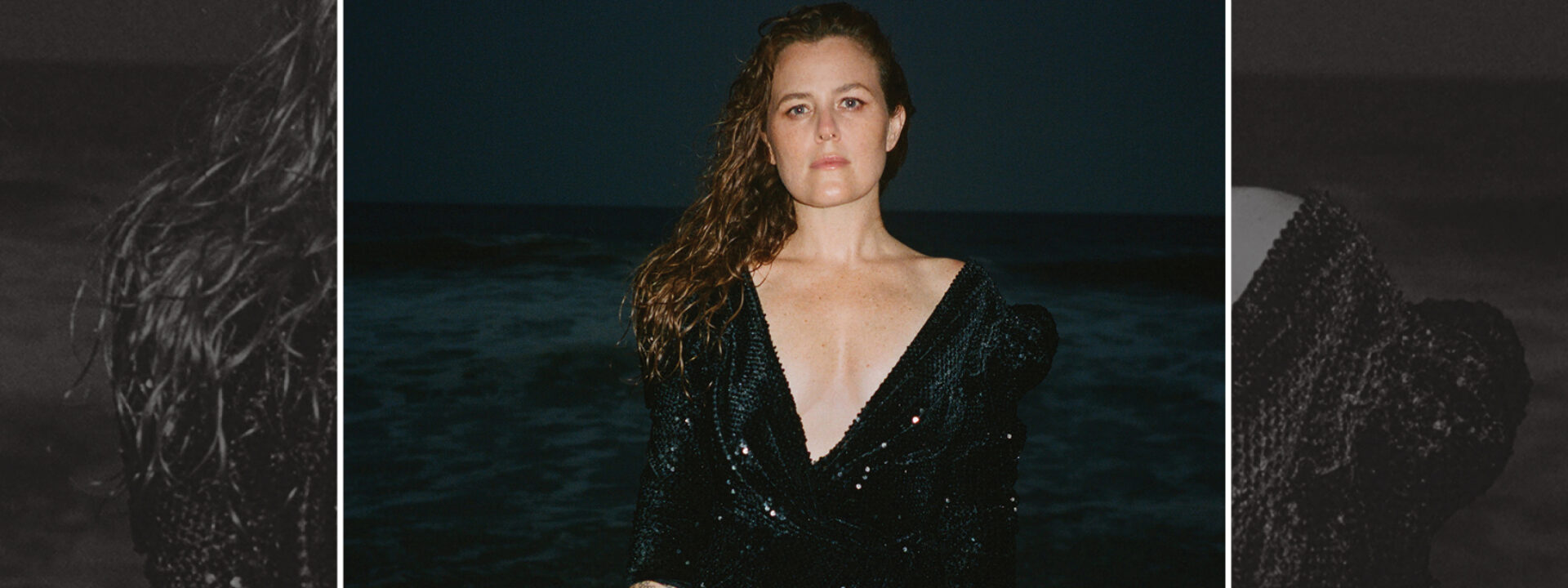
The 16th edition of the music and arts festival will bring more than 30 artists to James Street North, including plenty with deep connections to Hamilton.
It’s no exaggeration to say that Supercrawl has become synonymous with this city.
The September weekend of music and art has brought as many as 250,000 to James Street North for a free festival that is unmistakably and unapologetically Hamilton. Many of those Crawlers are visitors to Hamilton, some really seeing the city for the first time.
Supercrawl turns 16 this year and it’s delivering plenty of talent – more than 30 musical acts – to its stages on Sept. 13-15.
Headliners include Texas quartet Explosions in the Sky, Canadian blues guitarist and singer-songwriter Matt Andersen, Rural Alberta Advantage, an indie rock-roots trio based in Toronto and dance-pop showman Rich Aucoin of Halifax.
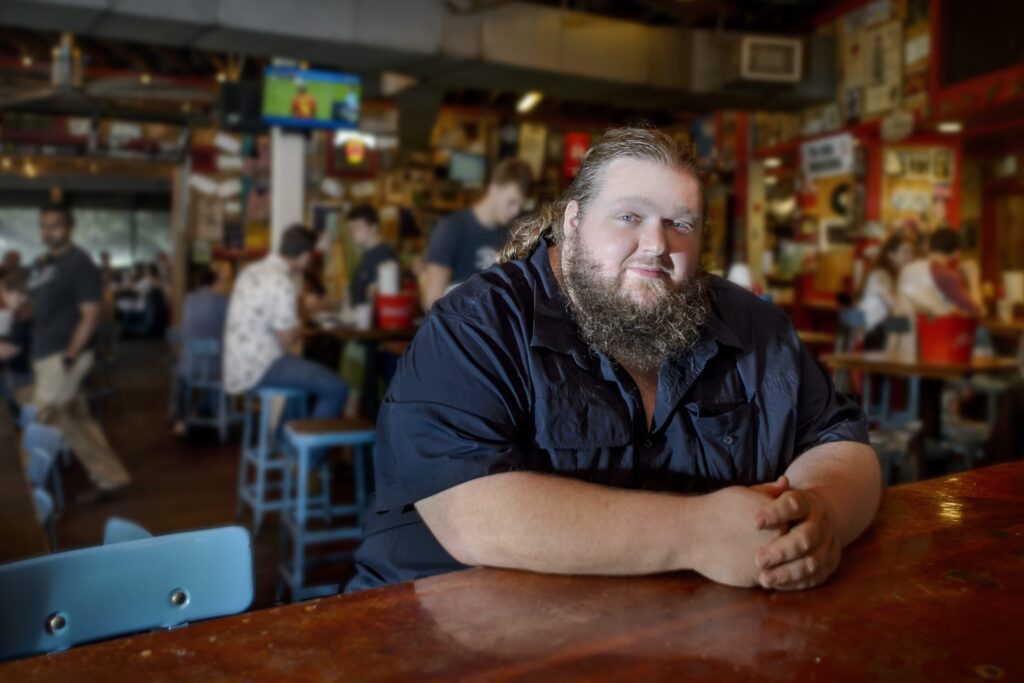
Hometown acts include Elliott BROOD, Golden Feather, Ellis, Bend it Like Beck, the Hamilton Philharmonic Orchestra, the Hamilton Children’s Choir, Jambassadors and the Hamilton Superstars led by local bluesman Steve Strongman.
Former Hamiltonian iskwē, gets a special nod here, too.
Canada is well represented with the likes of The Sadies, Danko Jones, Monkey Junk, Zeus, The Dears, My Son the Hurricane and Charlotte Cornfield.
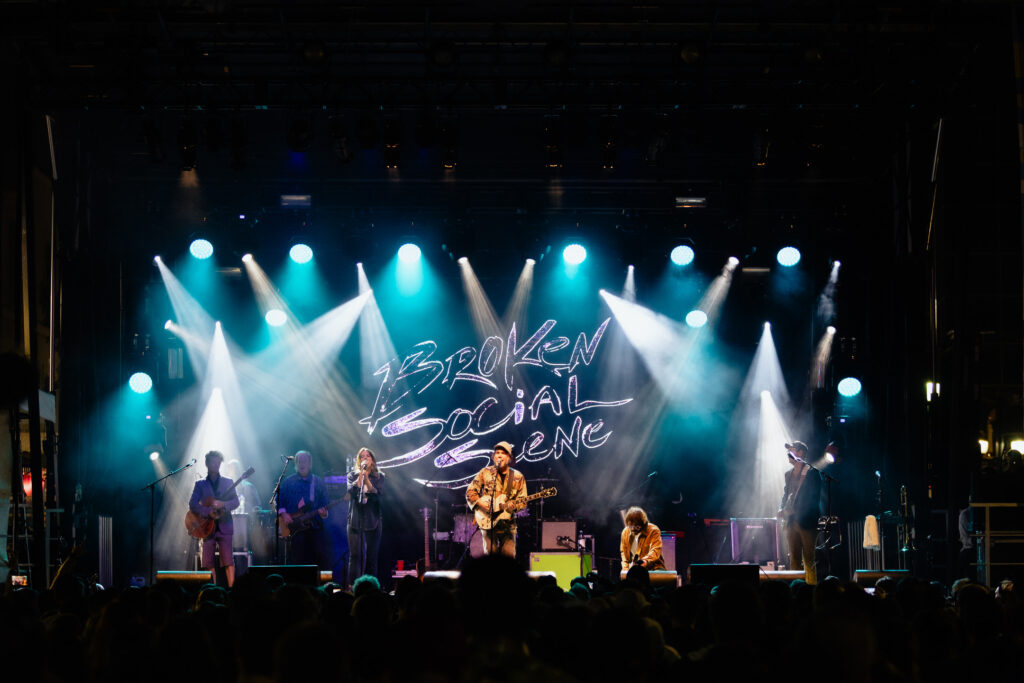
The budget
Supercrawl operates on a budget of $1.1 million to $1.2 million. About 40 to 45 per cent of that comes in government grants, says Tim Potocic, Supercrawl co-founder and festival director. The remainder comes through sponsorships and vendor fees.
Potocic says Supercrawl’s municipal and provincial funding is back up to pre-pandemic levels, though he’s still waiting to hear about a federal grant.
“We’re hoping it’s where it has been in the past. We applied for the maximum under the program,” he told HCM. That grant was cut by 60 per cent last year, so budget models for this year are based on that lower number.
The festival operated at a $100,000 loss last year. As well, Sonic Unyon, the record label and events management company that presents Supercrawl, did not get paid for its services, says Potocic. Altogether, Supercrawl was down $200,000 this year.
CHECK OUT COVERAGE FROM SUPERCRAWL 2023
“We can mitigate that loss because we have the ability to not pay ourselves. Most festivals don’t have that luxury.”
While it’s a tough environment to land corporate sponsorships, Potocic says that number is up over last year and he and his team are working on more deals.
He says he and his team get inquiries from many other cities that want to replicate the magic of Supercrawl.
“They’ve picked our brain for the model. We need to do a better job of getting that message out about what Supercrawl means and the impact we have. We are serving a community that can’t always afford to buy tickets and giving them an opportunity to get out and support the bands they love.”
The roughly two-kilometre stretch from King Street to Liuna Station is anchored by two main stages at each end. In between are hundreds of vendors selling art, handcrafted items, Hamilton gear and about every manner of food you can imagine. There are street performers, art installations, fashion stages and a tent featuring local authors.
iskwē: The spirit of Supercrawl
Singer-songwriter iskwē will make her third appearance at Supercrawl this year. A Hamilton resident for about four years beginning in 2016, she last played a set with Hamilton’s Tom Wilson when Supercrawl was virtual in 2021. Her first appearance was in 2018.
iskwē’s fourth solo album, nīna, came out in April. It’s the product of a turbulent time in her life. She was finalizing a divorce and had moved from Hamilton to a new city where she didn’t know anyone. Then the pandemic and the ongoing isolation struck.
She felt the need to escape and found an excuse when she and a past flame she met in Argentina reconnected online. They had previously talked about meeting in Mexico, so that’s what they did. That experience – though the relationship didn’t last – was like being reborn.
iskwē likens it to that feeling Canadians know oh too well when a cold dark winter finally lifts and you can get outside again. The colours and smells of Mexico were intoxicating, she says, recalling a trip to a market where she was overcome by emotion.
“I’m a well-travelled person and I have never had an explosion of senses like that.”
The album is iskwē’s most personal and autobiographical yet, containing vignettes of love, heartbreak, loss, resilience and triumph.

“I'm very romantic,” she says during a video call from her home. “I live in my own fantasy land all the time. You know, it's what keeps me sane and happy, where I'm just creating little stories in my head. And, you know, like little glimmers of them exist in real life, and then the rest just exists in my mind.”
The two lived at the beach and wandered Mexico for three weeks. They were even arrested in Puerto Escondido during a sweep of people at an outdoor market who weren’t wearing masks. She spent three hours in a cell with her dog before being released.
“We weren’t trying to defy the rules. We just didn’t understand we had to wear our masks outside.”
When iskwē connected by Zoom with 10-time Grammy nominated producer Damian Taylor (The Prodigy, Bjork, Arcade Fire, The Killers and Bomba Estereo) to iron out plans to record two songs, she told him about Mexico. He immediately offered to meet her there. So plans to meet at his studio in Los Angeles were scrapped. Taylor and iskwē spent hours just talking before hours of music started each day. She felt encouraged and listened to and her creativity blossomed.
“I have done a lot of work on this, but pre this record, I came with a lot of brick walls. I came with a lot of protection and security. And, you know, I think this was just that moment where I was able to start with the help of a new friend, chip away at that, and tap into a place that I hadn't done before,” she said.
“By day two, we recognized that these two songs is an album. We changed everything, booked it out for another month and a half or something like that, and did the record.”
The time was right to turn her songwriting inward where before it had been more about social issues and activism. The name nīna comes from the Cree word for “me.”
“You know, for whatever reason I have no idea, I don't know that as an artist, you ever really know why the time is now on when you feel a thing. It just was the time for me to create in that way.”
Now in her early 40s, iskwē says she understands the importance of nurturing her close relationships and she’s better able to be empowered by positive reactions to her work and let go of the negative.
“The amount of emotional pain that I experienced over the last batch of years was so severe. However, the joy that I felt once I got to the other side of that pain is indescribable, the relief, the release, the euphoria, the sense of self, the recognizing who your real people are, and going like, okay, you know, the number got smaller, but these people are my people, and I can lean on that with everything I have.”
iskwē, who is Cree-Métis and hails from Winnipeg, has lived in many different places. She and her ex-wife were living in Toronto when their landlord decided to sell. She had been interested in Hamilton for a while, after hearing stories of art crawls and Supercrawl, and this was a chance to head this way.
“Something in my gut was telling me that this is a good spot to go. And at the time, my ex-wife was super Toronto and had no interest in leaving. And I was like, ‘Come on, let's go. Let's go.’ So we found a house that we could afford. We hustled, made it happen, got there, and they fell in love with it.”
Four years in Hamilton makes it the longest time she’s spent in one place. And it’s the only place she’s lived where people would approach her in coffee shops to chat about her music.
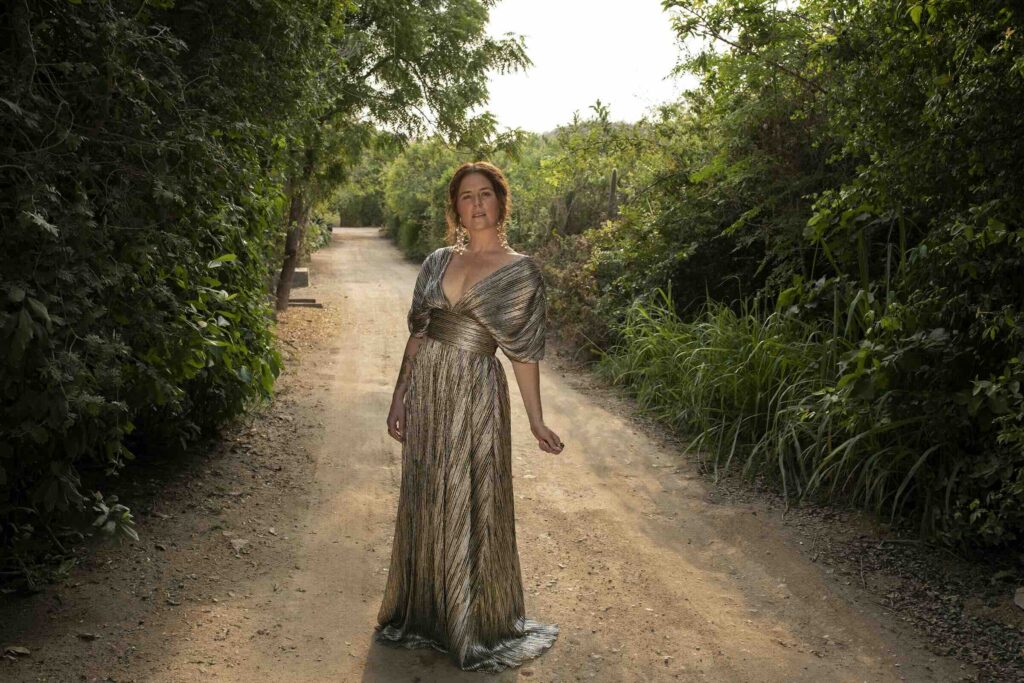
Her first Supercrawl experience was taking it in as a spectator. And though she doesn’t like crowds, she felt it really showed her the city.
“So I was like, well done, Hamilton. Like, people really turn out for it … It was just nice to see the joy of it, the celebration of it, the pride of it, the fact that this is Hamilton made. It's just not a common feeling that you go out into the world and see that level pride in an event that's taking place. Like, of course, people show up for events that take place in other places, but there's a certain type of spirit involved in Supercrawl that I think is quite unique to Hamilton.”
iskwē met Wilson while they were both spectators at a softball game. Their professional relationship began when the Inspire Awards invited the two of them to perform Wilson’s “Blue Moon Drive.”
“I was excited to sing with Tom, because he's an incredible artist. I love his voice. I love his music,” says iskwē, who loved the experience of performing with someone else.
“It felt artistically and soul satisfying to sing that type of harmonies with him, like with this baritone voice, and mine up here, and I'm quite small, and he is gigantic, and both have big hair, so it was just like something to it that felt really freeing and fun.”
From there, they collaborated on Mother Love, with Wilson writing the songs alongside Serena Ryder. It was the first time she got to interpret the writing of someone else.
“It was actually very liberating in its own way, because I wasn't held tight by what my own meaning of it was when I wrote it, because I didn't write it.”
iskwē is a fully formed artist. She’s a dancer, a designer, a performance artist. She even shot and edited the video for “A Little Piece,” the lead track from nīna.
The day before our interview, iskwē worked with an engineer in a studio. He had a rough outline of a melody based on a previous session. Within an hour, iskwē had lyrics together and in another hour, they had a demo.
“The foundation of the track was just boom, fell together. So sometimes it's like that, sometimes it's that easy. Those are the ones where I'm like, yeah, the easy ones are the keepers. The ones that you really have to struggle through, I just think I don't think this one belongs to me.”
‘Hamilton always shows up for a good time’
Hamilton-based alt-country trio Elliott BROOD have played Supercrawl twice over the years, most recently in 2018 when they closed the festival on Sunday on the northern main stage.
“That was a big deal for us and we are really excited to be back this year,” says percussionist Steve Pitkin.
“It really is the Holy Grail of gigs.”
The band, which released its debut album in 2004, released Town in November and its companion album Country in March. They extensively toured Canada last fall and spring and then embarked on a European tour in April, with stops in Germany, Netherlands, Belgium, France and the U.K.
Among their dates this summer, Elliott BROOD will play the Calgary Folk Music Festival in July, and the Bear Creek Folk Festival and the Kitchener Blues Festival in August.
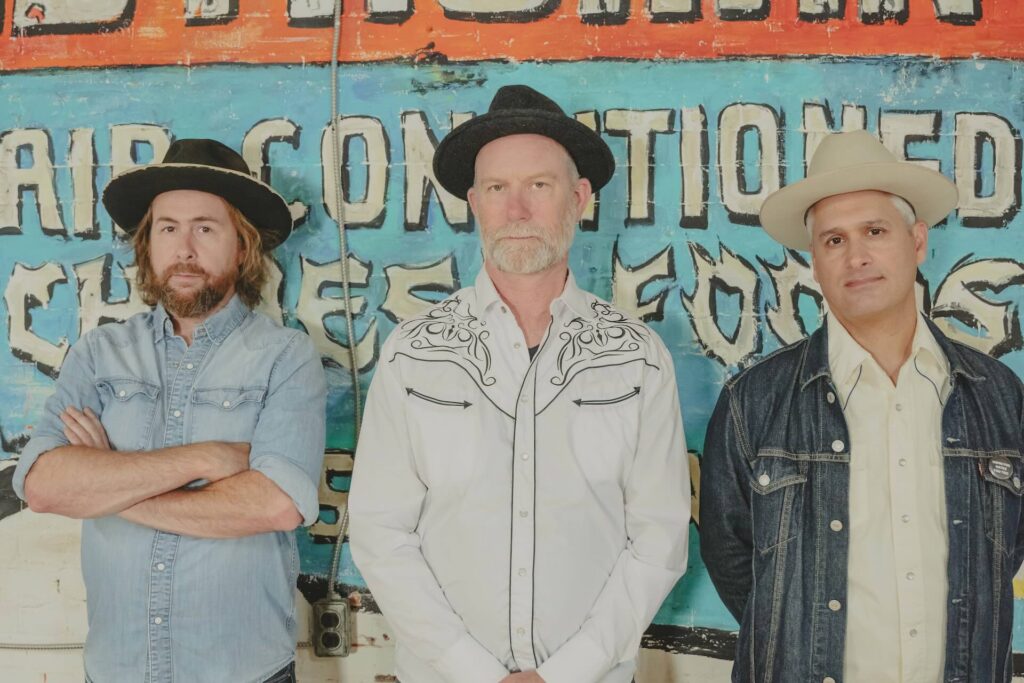
Potocic is especially excited to have New Brunswick’s Andersen headline the mainstage on Saturday night (Sept. 14). He’ll be joined by a 12-piece ensemble called The Big Bottle of Joy, that includes back-up singers and a horn section.
“I loved the vibe of Supercrawl that last time I played there,” Andersen told HCM. “Hamilton always shows up for a good time. I can’t wait to hit the stage with the big band."
Further lineup reveals for art, dance, author readings, fashion and food vendors, as well as some more local acts, will be made in the weeks leading up to the start of the festival.
Returning for their second run at Supercrawl is Pittsburgh-based performance art ensemble Squonk.
“We are an outdoor spectacle producing original music, staging and design,” says founder Steve O’Hearn.
“There is nothing really like us in the American touring market.”
Its first show was 32 years ago in a junkyard and featured cranes stacking cars to music.
Squonk’s new show is called Brouhaha and features huge bellows that operate a foghorn organ played by on-stage musicians and audience members.
“There’s something very democratic and accessible about what we do. There is a surprise factor to it. We put a lot of effort into audience participation,” O’Hearn says.
“It’s really fun to see people play their hearts out.”
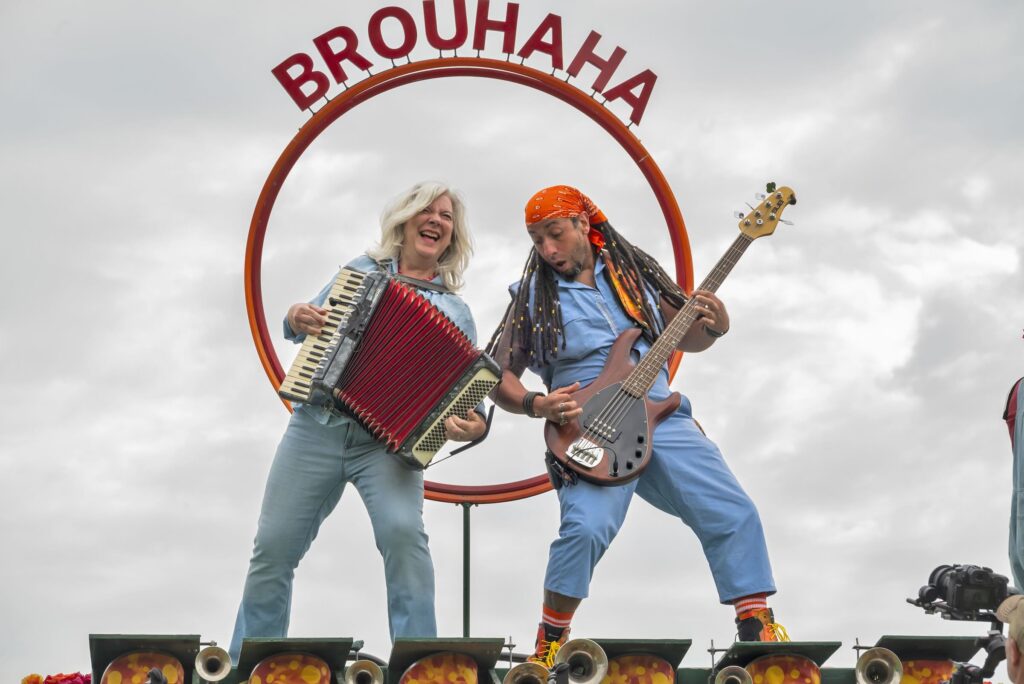
Squonk shows are created in a highly improvised way but once staged, they are tightly choreographed. The show features five musicians and five or six technicians operating giant puppets and moving props but there is no absolute delineation of roles, says O’Hearn, who plays bagpipes and other wind instruments in the show. Everyone participates in producing music and several musicians operate props.
“Supercrawl is one of our favourite festivals and we play a lot of them,” says O’Hearn. Hamilton feels familiar and comfortable and James Street North is a great urban street.
“Pittsburgh and Hamilton are both mid-sized, industrial cities with an arts focus. There’s no pretense. A show like this is about imagination and physical labour. That works so well in cities like Pittsburgh and Hamilton, rather than New York City and San Francisco.”












